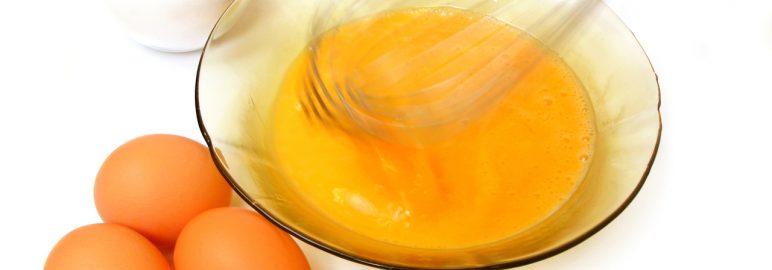The more research that’s published about eggs, the more it’s incredible that so many of us keep calling them a healthy choice. It could be because we’ve found so many good uses for them; they’re hard to give up.
Most of us believe that eggs are one of the healthiest foods we can eat, especially if we need a good source of protein. But when an egg company asked the USDA’s Poultry Research and Promotion program what they could say to make eggs sound healthy in their advertising, the responses were eye opening. The USDA reminded the industry that:
- “You can’t couch eggs [or] egg products as being ‘healthy’ or ‘nutritious.’”
- “Because eggs have the amount of cholesterol they do” the words healthy and nutritious “are problematic.”
- You can’t “portray eggs as a diet food, because of the fat and cholesterol content.”
- Eggs “have nearly twice the calories of anything that can be called low-calorie.”
The USDA did allow the term “nutrient dense” when referring to eggs, but that’s because there is no legal definition of nutrient-dense. Full-sugared soda can be called nutrient dense.1
A 2013 meta-analysis compiled all the highest quality studies covering egg consumption and the risk of heart disease going back to 1930. All together, the results indicate that those who ate the most eggs had a 19 percent increased risk of getting cardiovascular disease and a 68 percent increased risk of diabetes. Those who got diabetes, then had an 85 percent increased risk of getting heart disease. Unfortunately, it didn’t take many eggs. Eating less than a single egg per day was associated with a significantly increased risk of heart disease. Slightly more than half an egg a day may increase the risk of getting heart disease risk between 6 percent and 40 percent, and increase the risk of diabetes by 29 percent.2
Egg consumption is also linked to many cancers. For example, there appears to be a dose-response relationship between egg consumption and cancers of the gut. Eating just a few eggs each week may be associated with a 19 percent greater risk of colorectal cancer, but the risk shoots as high as 71 percent for those who consume three or more eggs per week.3
Additionally, there is an increase in breast cancer risk with egg consumption, especially for women who eat up to around five eggs a week.4
With solid research like this, we should all strive to eliminate eggs from our clients. If you feel like you can’t do it all at once, try to eliminate at least four eggs each week. Following are some ways to help get you started.
- In baked goods, just whisk one tablespoon ground flax seeds with 3 tablespoons water for every egg you want to replace, and let the mixture sit for 5 minutes. If you mix it up before you put all your ingredients together. The mixture will be ready when you are. Note, this works great for up to three eggs. Recipes calling for more than three eggs, including meringues, require another option (see next bullet point). Other egg replacers for back goods include:
- Commercial egg replacers, such as Bob’s Red Mill.
- Mashed banana, applesauce, or even silken tofu.
- If you want to avoid an occasional crunchy seed, cook flax seeds in water for several minutes, then strain out the seeds to make a sort of egg white substance. Make sure you clean up your utensils and pans quickly or the mixture will stick fast.
- Consider this: If you want the egg to also help raise the dough, use the flax seed mixture.
- For meringues or recipes with more than 4 eggs, try using aquafaba. This is essentially the liquid that comes in a can of beans. For details this and how to use it (including how to make a meringue) check out this link at glueandglitter.com.
- To replace egg as a binder, such as in a casserole, use breadcrumbs or oats, or use 2 tablespoons of cornstarch mixed with 2 tablespoons of water for each egg.
- If you’re eating eggs at breakfast or lunch for a quick source of protein, choose legumes instead, such as an oil-free hummus, or a tofu dip or a big salad tossed with peas or edamame. Oats or other grains topped with a handful of nuts, flax seeds and fresh fruit can make a great egg-replacing breakfast. (Or use a flax egg and plant milk in your favorite pancake recipe.) Your heart will thank you.
References
- Documents obtained through the Freedom of Information Act.
- Li Y, Zhou C, Zhou X, Li L. Egg consumption and risk of cardiovascular diseases and diabetes: a meta-analysis. Atherosclerosis. 2013 Aug;229(2):524-30.
- Tse G, Eslick GD. Egg consumption and risk of GI neoplasms: dose-response meta-analysis and systematic review. Eur J Nutr. 2014 Oct;53(7):1581-90. Epub 2014 Feb 6.
- Keum N, Lee DH, Marchand N, Oh H, Liu H, Aune D, Greenwood DC, Giovannucci EL. Egg intake and cancers of the breast, ovary and prostate: a dose-response meta-analysis of prospective observational studies. Br J Nutr. 2015 Oct 14;114(7):1099-107. Epub 2015 Aug 21.

Sorry, comments are closed for this post.